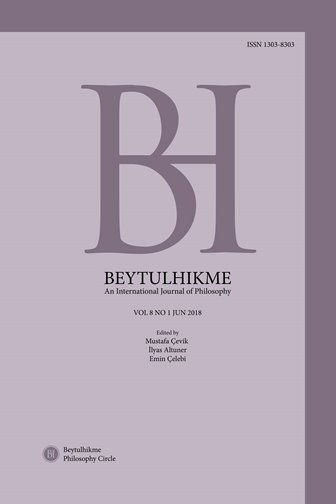Author :
Abstract
Bu makale Muhammed İkbal’in eylem kavramına ilişkin görüşlerini Charles Taylor’ın eylem felsefesi bağlamında ve ışığında felsefi olarak incelenmesini sunmakta ve İkbal’in kendi eylem teorisini inşa etmeyi amaçlamaktadır. İkbal eylem kavramını felsefesinin merkezi meselelerinden biri olarak ortaya koymasına rağmen bu kavram İkbal araştırmacıları tarafından yeterince ilgi görmemiştir. Eylem kavramı aynı zamanda yirminci yüzyılın ikinci yarısından itibaren modern felsefenin de ilgi gören meselelerinden biri haline gelmiştir. Fakat bu modern felsefi alan mevcut haliyle batılı olmayan filozofların muhtemel katkılarını görmezden gelip batı düşüncesi merkezli bir yaklaşım sergilemektedir. Bu çalışma ile literatüre üç şekilde katkıda bulunulması hedeflenmektedir. Birincisi, Müslüman bir filozofun eylem kavramına ilişkin görüşlerini ortaya koymak suretiyle çağdaş eylem felsefesinin tartışmalarına İslami bir bakış açısıyla katkıda bulunmak; ikincisi, İkbal’in hak ettiği ilgiyi görmemiş bir kavramını felsefi bağlamda incelemek suretiyle İkbal çalışmalarına katkıda bulunmak ve üçüncü olarak da, daha önce müstakil bir çalışmada bir arada ele alınmamış bu iki filozofun görüşlerini karşılaştırmak ve aralarında bir diyalog geliştirmek suretiyle karşılaştırmalı felsefe literatürüne katkıda bulunmaktır.
Keywords
Abstract
This article provides an analysis of Muhammad Iqbal’s views on the notion of action in the context and light of Charles Taylor’s philosophy of action and attempts at constructing Iqbal’s own theory of action. Despite the fact that the Notion of action is one of the central issues of Iqbal’s philosophy, the literature on Iqbal lacks in the studies dealing with this notion in a philosophical context. The notion of action has also become one of the popular topics of modern philosophy since the second half of the twentieth century. However, current discussions in this field present a narrow understanding of the term by ignoring non-western philosophers’ contribution to the field. Therefore, it is aimed at this study to contribute to the literature in three fields: to the literature of contemporary philosophy of action by highlighting the views of a Muslim philosopher on the notion of action, to the literature on Iqbal by examining one of his central concepts that deserves to be taken more seriously in a philosophical context, and finally to comparative philosophical studies by comparing the views of these two philosophers who have never been brought together in a study, and by developing a dialogue between them.
Keywords
- Hassan, R. (2015). Introduction. Muhammad Iqbal. Essays on the Reconstruction of Muslim Thought. (Eds. H. C. Hillier & M. B. Koshul). Edinburgh: Edinburgh University Press, 1-11.
- İkbal, M. (2014). İslam’da Dini Düşüncenin Yeniden İnşası. (Çev. R. Acar). İstanbul: Timaş Yayınevi.
- Sher, G. (1975). Charles Taylor on Purpose and Causation. Theory and Decision, 6, 27-38.
- Taylor, C. (1964). The Explanation of Behaviour. London: Routledge & Kegan Paul.
- Taylor, C. (2010). Hegel and the Philosophy of Action. Hegel on Action. (Eds. A. Laitinen & C. Sandis). Hampshire: Macmillan & Co.
- Taylor, C. (2011). Preface. S. B. Diagne. Islam and Open Society: Fidelity and Move- ment in the Philosophy of Muhammad Iqbal. Dakar, SEN: Counsel for the Development of Social Science Research in Africa, xi-xii.
- Wilson, G. & Shpall, S. (2016). Action. The Stanford Encyclopedia of Philosophy. (Ed. E. N. Zalta). https://plato.stanford.edu/archives/win2016/entries/action.
- Wittgenstein, L. (2014). Felsefi Soruşturmalar. (Çev. H. Barışcan) İstanbul: Metis Yayınları.





